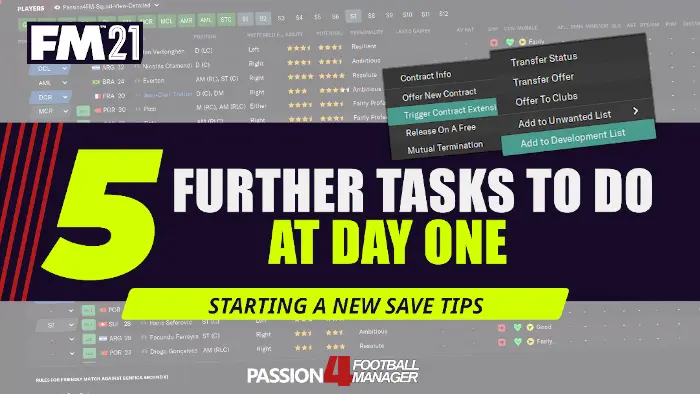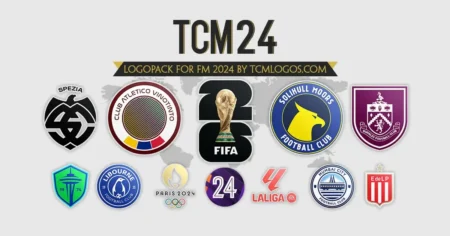5 Further Tasks to Do When Starting A New Save in Football Manager
Nothing beats the thrill of starting a new save in Football Manager. The excitement to get straight into the action as quickly as possible can easily outweigh common sense as you are eager to lead your new club on the road to glory. It’s easy to get carried away by clicking the Continue button far too early!
Before starting a new save in Football Manager I’d like to talk to you about how you can nail down day one in Football Manager by sharing the different tasks and the things you need to do so you can lay the foundation for a successful save from day one and onwards.
Personally, I’ve perfected how I approach day one in Football Manager after years of expertise, but still, I can use hours setting up my save, getting to know my players and backroom staff, and most importantly spend hours browsing the transfer market to identify possible transfer targets… and I love it!
To build upon last years guide looking at the first things I do when loading a new Football Manager save I’d like to give you 5 further tasks to do at day one of your new Football Manager save.
Here you’ll get more actionable steps to take rather than simply tips about how to set up your save for highest efficiency.
The objective of these two articles combined aims to lay the proper foundation for a successful save by handing you a few simple tips and essential things to do at Day One of Football Manager in order to ensure you get off to a flying start.
This time I’ll go beyond importing essential add-ons and delve deeper into the matter!
Join me as I share what you need to do before starting a new Football Manager save as I put attention to squad planning, player recruitment, transfers and contracts as well as building relationships with people around you in order to get you off to a positive start.
A Background
It’s no secret that I can spend hours having fun with laying the foundation for my save, and as pedantic it may sound, it can take hours before I hit the ‘Continue button’ for the first time. It’s all about being hands-on as early on as possible to get as most out of my coming save as possible.
The value of spending a few extra hours on the first day of management provides me with long term benefits letting me focus on other areas within my save in the coming weeks as the nerve of matchday and focusing on the next opposition will be in focus.
Whether your objective is to improve your finances and squad quality 3, 6 or 12 months ahead, the main job starts at Day One by being proactive rather than reactive by being hands-on and take advantage of every opportunity within your save as possible!
Using the time effectively in the first days of management can give you a better foundation for the rest of your save which you can benefit from throughout the season.
My approach to the first days of a new save is all focused on making the process of gathering as much information and data as quickly and effectively as possible. I feel it’s important to be methodical at this stage to ensure my save is in the best hands.
Let’s be honest.
Entering a new club or a new league can be difficult. Especially if it’s a new club to get acquainted with or a new league structure and nation to get to know of. The information and data to process about the club, its players and the nation may look overwhelming – reason why it can be beneficial to have a quick and effective “template” which you can use from save to save in order to get your new save off to a great start.
Below you’ll get an insight into my working list as a manager of a new club in Football Manager which you can apply for your first Football Manager save.
P.S. As pointed out earlier, I’m one who always goes for the earliest start date to get lots of time to prepare myself and my players for the league start and use the pre-season as effective as possible.
1. Know Your Squad
Analyzing your squad and planning for the future is an important step to take! The key is to spend the first hours within your new save to get to know your squad. The main aim is to learn about the true quality of your squad and its potential.
The first step I take is to go player by player to learn as much about them as possible. Here I’ll carefully study the Team Report > Squad Depth, Development Centre and reading through Player Report Cards of all my players.
Besides the obvious point of understanding each player’s current ability level, role and how they might fit the selected tactics relating to their traits and player attributes, it’s important to get an overview of players;
- age and abilites vs value
- positional abilities (squad depth)
- Contract status (contract expiring and wages)

The objective in this instance is to sketch out a plan for the next seasons ahead. When browsing through your squad I want you to pay extra attention to each players contract; their wages, bonuses and clauses relating to agreed playing time and age. Following is what I look for:
- Are there any important players on an expiring contract? If yes, offer them a new contract immediately.
- Or Trigger the Contract Extension clause if the player has one
- Are there any players on high wages that is playing at close to their fullest potential or might be surplus to requirements within the next seasons? If yes, consider transfer list the player immediately to free up funds for a replacement or let him get as much playing time as possible to maintain his value whilst you spend the next months carefully looking for a replacement.
- Are there any promising talents with much potential that might become valuable players for the first team into the future? Offer him a better contract if possible and promote him to the first team and let him train with the first team. This is important if your youth facilities are poor or you lack quality youth coaches. To ensure they get valuable match experience make them available to play for the Under-18 or Reserves and slowly introduce them to the first team.
- Are there potential breakthrough prospects that you can’t promise regular playing time to aid his development? Put him on a Development List and loan him out. This is highly valuable if the league standard of playing in the Reserves or Under-18 team exceed the current ability of the player which makes it far more advantageous to loan him out to a better club.
- Do you got players out on loan? Check their Loan Clause and Terminate loans of players that might become a significant player or be used as a useful back-up option. I often terminate loans for players at higher values and put him on a transfer list to try to increase the current transfer budget.
2. Enhance Your Scouting Pool
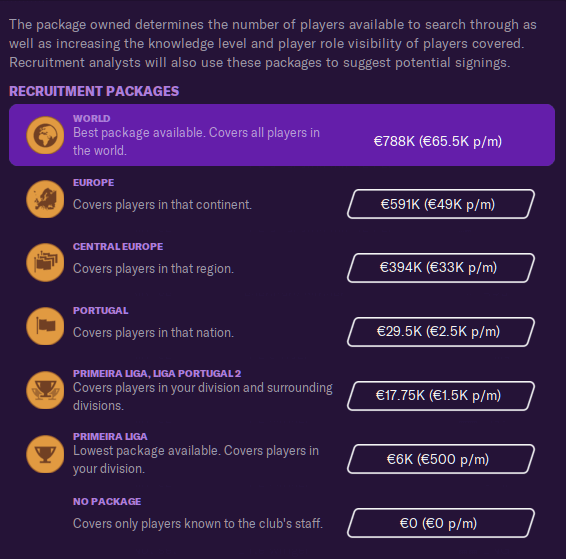
Upgrading your scouting packages might be a beneficial step to take in order to increase your scouting pool. The recruitment packages basically determine the number of players and staff available to search through and the knowledge level of these players.
Selecting the appropriate scouting package is one of the first decisions I take when coming into a new club. Here I’m no stranger to spending a few extra bucks on upgrading to the highest possible senior or youth package.
The benefits of being able to filter through 80000 players compared to 10000 give me more leeway in the transfer market, both in terms of spotting hidden bargains, future wonderkids and/or important players that surpass the ability level of my current squad and the players within my league.
3. Browse The Transfer Market Immediately
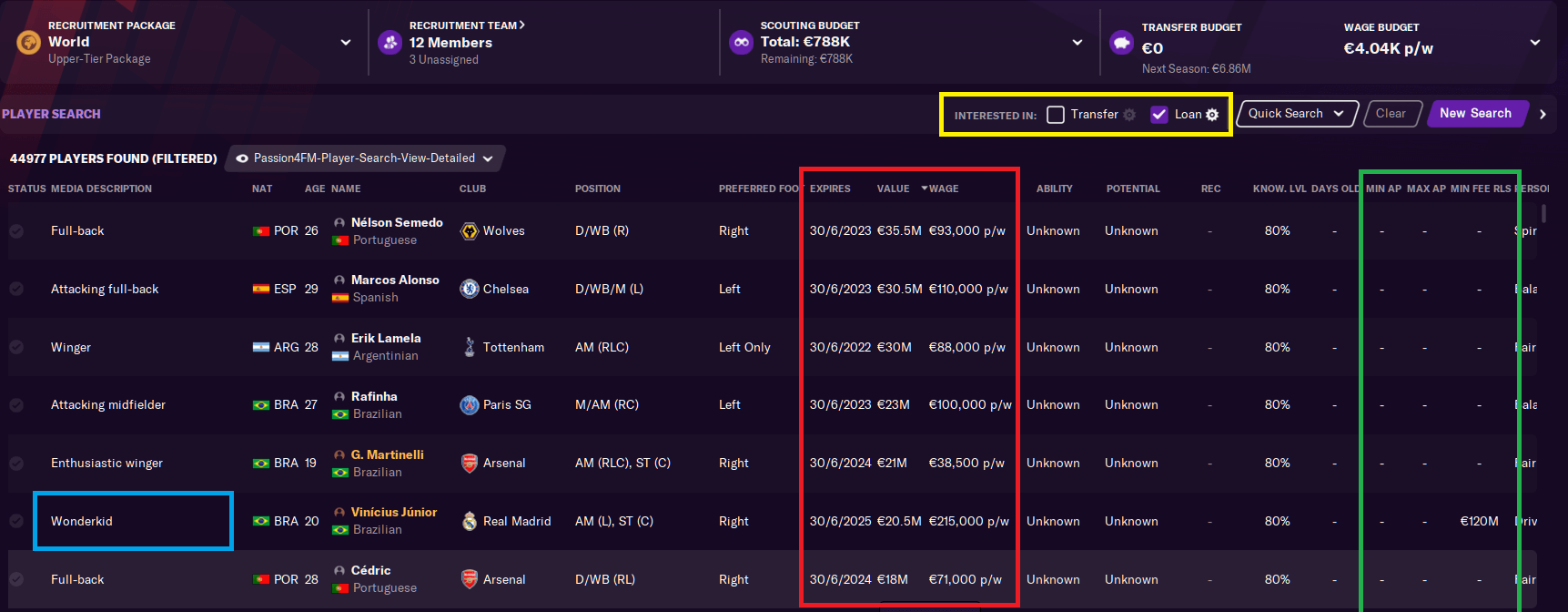
While on the topic of scouting, it’s important to use day one to delve deep into the transfer market to check for any opportunities. The quicker you make a move and the more methodical you are when delving into the transfer market as early on as possible, the bigger chances to spot some potential bargains and cheap future wonderkids who can improve your squad.
Let’s face it, your opponents won’t wait for you and when you are ready to scour the transfer market.
By using some extra time at day one in Football Manager to look for transfer listed players or players put up on the loan list might help you find both short term options and potential first-team candidates at a great deal. Here it’s important to pay attention to which button is clicked in the Interested In
Uncheck both ‘Interested in Transfers and Loans’ will give you all players available in the current database size / scouting pool. the scouting pool depends on the level of Recruitment package you have.
Whilst transfer listed players should be monitored frequently throughout the season you should browse the transfer market at day one for;
A) Unattached players: These players are available at free transfer and come with less risk than signing players at a transfer fee. The only expenditures you may have are wages, appearances fee and agent fee. You can quickly identify players on free transfer by using the search filter:
New Search - Contract Status: Unattached
Observe the player status information and whether he is wanted and by whom may give you an indication of his playing abilities. You can also browse the search result by world reputation and/or set more conditions to limit the search result.
Our list of the best free agents in Football Manager 2021 will definitely be of help as you will be able to find free players from Premier League level to League One!
B) Players on Expiring Contract: The option to search by players on expiring contracts 1 month to 1 year into the future can be a useful way of keeping tabs of likely prospects and enquire about his interests. This means you can start pursuing the player and trying to unrest him by declaring an interest.
This search filter is most beneficial in January as you can filter players by contracts expiring in 6 months. This will identify players available to be Approach to Sign and might let you offer him a pre-contract without needing to pay any transfer fees to the club. This way you’re able to swoop up great players at a bargain price.
You can find likely candidates by using the search filter:
New search - Contract Status: Expiring (6 Months)
C) Spy on Asking Prices & Minimum Fee Release Clauses
A sure way to spot bargains are by filtering by players minimum/maximum asking price or minimum fee release clause. This information will be visible the more scouting knowledge you got. But for the ones within your scouting range, filtering the search according to minimum fee release call might let you spot some bargains you can pursue.
New search - Advanced Conditions - Contracts - Minimum Fee Release Clause
D) Players Interested in Loan: Not everyone will have a huge transfer budget to go out to hunt for wonderkids or bargains. Some clubs are forced to use the loan market to improve their squad depth. You can approach the loan market in two ways:
– If you are linked to a senior affiliate club with the ability to get players on loan without any other cost than wages, then use it!
– Secondly, if you’re playing in a lower league, browse the clubs’ first team and reserves playing in one to two divisions above you. You might want to search according to their agreed playing time and players listed on loan.
– Lastly, search the scouting pool for players only interested in loan. Perhaps a likely back-up candidate or a promising youngster with lots of potential may appear, which can be your chance to acquire his interests for the long term.
4. Set up Pre-Season Training

Setting up the appropriate training can easily be forgotten in your eagerness to get into the match action. Whilst some of you might leave training to your assistant manager I spend day one setting up pre-season training!
How long the pre-season is will have a major influence into how the pre-season training calendar will look, but my sole objective when entering a new club is to fit my plan for friendly fixtures and intensity of training schedules.
For a proper pre-season training must focus on physical sessions and match preparations.
You want to improve players strength, natural fitness and work rate in order for them to endure the long season and reduce the likeliness of fatigue. Secondly, the match preparations should revolve around improving the tactical familiarity of your tactics.
Finally, I include specific training schedules that improve team cohesion which is an important factor relating to player positioning, vision and reactions on the pitch. Adding training sessions that improves team cohesion is essential whenever it’s poor! you can gauge the team cohesion level in the Overview of Dynamics.

Either you create your own pre-season schedules tailormade for your tactics and fixture list, or import mine you can create/import at:
Training > Schedules > Click Schedule Name > Pre-Season Training and select one of the default
or
Training > Schedules > Click Schedule Name > Custom Schedules > Import Schedule
Learn more about how I approach the pre-season and setting up pre-season training schedules in this article.
5. Interact With The Board: Upgrade Where you can

Take every opportunity that comes your way is a great saying that you can take with you both in life and in Football Manager.
Interacting with the board as early on as possible can have its advantages and disadvantages. It’s not like you can come into a new job and just demand lots of things, but monitoring the opportunities for upgrades in the club is important.
Despite I normally don’t make a board request on day one, I want to hand you the tip. Since you want to build a dynasty for your club, it’s important to upgrade when you can. There are particular three things I look at within the pre-season period to upgrade:
- Increase Transfer Budget or Wage Budget; which will give me more freedom at the transfer market
- Look For Affiliate Clubs; to either enhance the scouting knowledge. If minor team, find a senior affiliate to get loanees from a bigger club or get an affiliate to generate more money from sponsorships and TV money.
- Increase the Staff Allowed. In the first event, you want to increase the number of scouts or number of coaches.
Club Vision > Make Board Request > Networking / Finance / Staff
*If you’re a lower league club it might even be beneficial to have a Trial day to spot suitable players.
BONUS! Utilize the Performance Analyst
Knowing as much as possible about your next opposition is highly important. How shall you else counter their threat and build a game plan that increases your chances of a win?
As discussed in my last guide to the Performance Analyst it’s important to set up scouting assignments of your next opposition before the league starts.
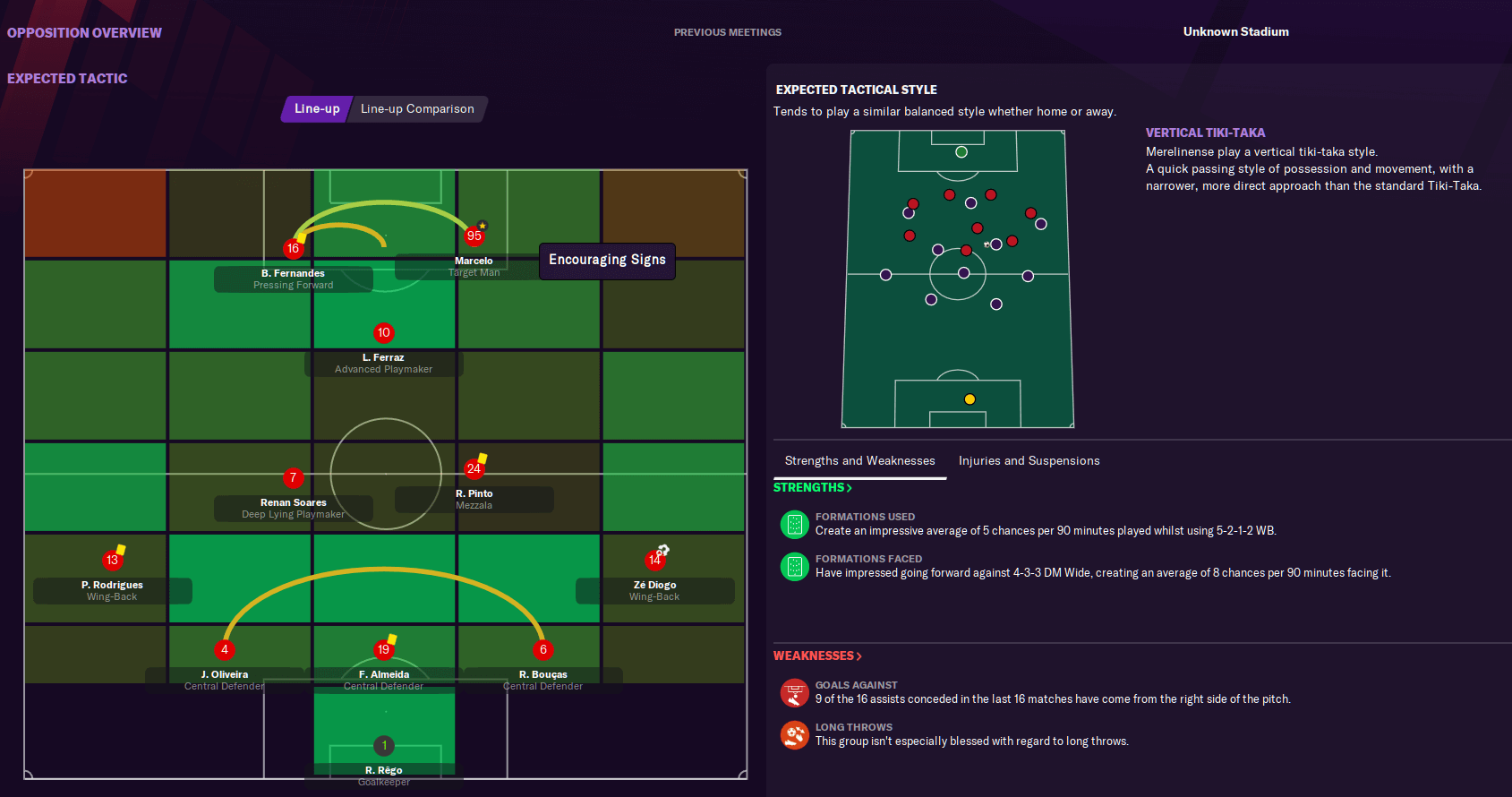
What you would like to do is to get analyst report of your next opposition as well as post-match analysis of your own team. By letting a Performance Analyst or the analyst pool gather reports about the next opposition you’ll learn more about their general performance, tactical style and other statistical data that let you identify strength and weaknesses of future opponents. The performance analyst will even report on the opponents defensive and attacking efficiency by crunching an expected goal for and against value which might come in handy.
Setting up analyst reports for the next opposition can be done while you are already setting up scouting assignments for your scouts to identify future potential signings. Here’s how to go about it:
Scouting > Assignments > Create New Assignment > Team > Ongoing Analyst Reports
Secondly, it can also be beneficial to get a more general scout report of the next opposition. This report will target more specific strength and weaknesses of the opposition as a team unit and will increase your knowledge about their players – both relating to attributes and abilities.


